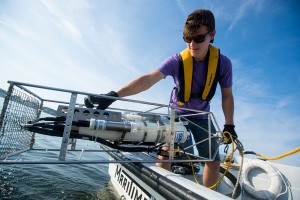PROVIDENCE, R.I. [Brown University] — The majority of Rhode Island residents are breathing unhealthy air, including elevated levels of ozone and particle pollution, according to the American Lung Association.
This summer, Brown senior Olivia McClain is helping to develop a hyperlocal understanding of the air pollution and its impact on individuals and community environmental health.
Since June, McClain has been a research assistant for a project led by Meredith Hastings, a professor of Earth, environmental and planetary sciences at Brown and the deputy director of the Institute at Brown for Environment and Society. Called Breathe Providence, the year-long project is siting 25 air pollution monitors across the city to test for seven pollutants, including carbon monoxide and dioxide, ozone, nitrogen oxides and particulate matter, such as dust, soot or smoke. The pilot project is part of a global initiative funded by the Clean Air Fund in partnership with organizations such as the City of Providence, the Racial and Environmental Justice Committee, the American Lung Association, and the Conservation Law Foundation, among others.
“We’re creating a neighborhood-scale air quality monitoring network,” McClain said. “We’ve been calibrating and siting the BEACO2N sensors, driving out to different parts of neighborhoods, taking pictures, and communicating with different building managers to identify locations to set them up safely.”
